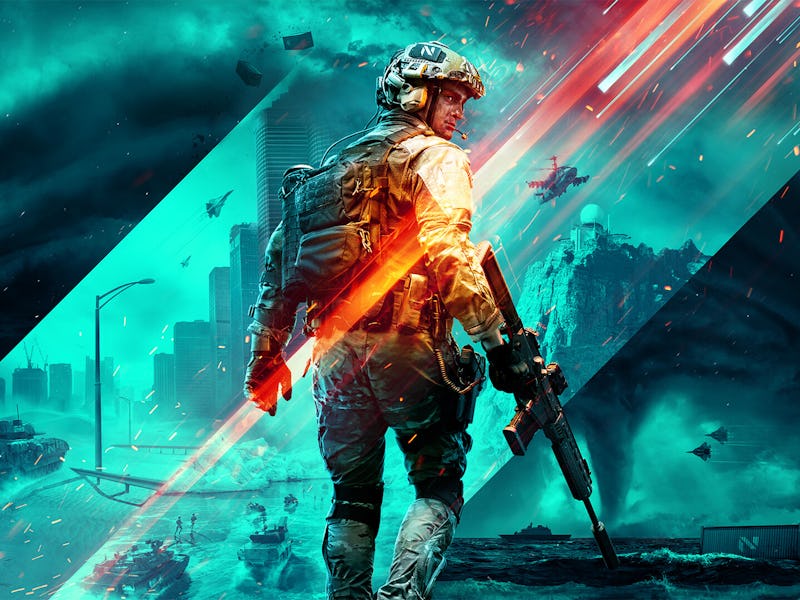Battlefield 2024 Season 7 Marks the End of an Era — So What's Next?
Motive Studio joins Criterion, DICE, and Ripple Effect.

Support for Battlefield 2042, the latest entry in the storied military shooter franchise, is coming to an end, a little over three years after its release.
Byron Beede, the general manager of the Battlefield IP over at Electronic Arts, published a short blog post on April 9 updating players on the future of Battlefield 2042, as well as a brief peak into what’s next for the series. In the post, he announced that 2042’s current seasonal update, dubbed “Turning Point,” will be its last.
“After Season 7 concludes, we will continue to support the game with new in-game challenges, events, modes, and of course, ongoing maintenance, but we are moving away from delivering official seasons,” Beede writes. “We know this may be disappointing. However, as we looked at what the future of the series required, it became clear it was time for us to shift our resources and focus to be fully dedicated to what comes next.”
As for what’s next for the franchise, Beede says Montreal-based studio Motive, best known for their work on Star Wars: Squadrons and last year’s critically acclaimed Dead Space remake, will be creating a small group within the team focused on Battlefield’s upcoming sequel.
“We’re tremendously excited for Motive, as they are bringing their expertise with Frostbite and compelling storytelling to the fold, joining DICE, Criterion, and Ripple Effect in building a Battlefield universe across connected multiplayer experiences and single-player.” Beede writes.
Battlefield 2042 launched in a buggy state when in released in November 2021.
There’s a lot to unpack in the pair of announcements. Perhaps first is the disappointing announcement that 2042 will be winding down. When the game launched in November 2021, the multiplayer-only title was plagued with bugs, and rife with unpopular design choices like replacing the familiar character classes of the series with Overwatch-like heroes (worth noting that a bulk of the game’s development took place during 2020). At launch, 2042 hemorrhaged players due to its poor state, becoming one of the worst-reviewed games on Steam.
Developers spent the next year updating the game in subsequent seasons, retrofitting the heroes into a more traditional class system, redesigning and rebalancing maps, and patching out bugs. Through a combination of building goodwill with players who stuck around and positive word of mouth, 2042 eventually found its footing, reaching an all-time high peak of more than 107,000 players as recently as last October, according to Steam Charts.
However, just months after hitting its stride, teams are ready to move on to what’s next.
Looking into the future, it’s not exactly clear what this focus on building a “Battlefield universe” with connected multiplayer and single-player elements is about. But it does conjure memories of EA’s last attempt to create a unified Battlefield service of sorts: Battlefield Portal.
A distant memory in 2024, Portal was an additional mode for Battlefield 2042 when it was released three years ago. It gave players full control over how they wanted to play the game and included access to just about every vehicle, weapon, soldier type, and classic maps throughout the series’ history. It was essentially Battlefield’s answer to the Halo series Forge mode and custom games. It was also an incentive for lapsed fans of the series to jump into the new game since they’d be able to recreate their favorite Battlefield games for free.
Weather events like tornados and sandstorms were a key feature in Battlefield 2042.
Unfortunately, Portal’s didn’t quite live up to what it promised. Thousands of players used the mode as a means to grind XP rather than faithfully recreate older Battlefield games. And while the rest of the 2042 package flourished with post-launch updates and improvements, Portal was left to languish, with zero additional maps being added to the base six included out-of-the-box, or new weapons.
Perhaps the most eyebrow-raising of the Battlefield announcements is the part about Motive Studio jumping on the Battlefield franchise. Coming off back-to-back hits, Motive has quickly become a crown jewel in EA’s portfolio of developers. While their Iron Man game remains in development, one industry insider says that a direct follow-up to 2023’s Dead Space remake is no longer happening because of their work on the next Battlefield.
“They were working on Dead Space 2, and they are no longer working on it,” Giant Bomb’s Jeff Grubb said on his Game Mess Mornings YouTube show Wednesday, citing a source close to the studio. “It is on the shelf because the first game had lackluster sales, is how it was phrased to me.”
Electronic Arts refuted Grubb’s claims.
“We don’t normally comment on rumors but there is no validity to this story,” a spokesperson told Inverse.
Motive’s addition to the next Battlefield project could mean great things for the game. But when three other ultra-talented, EA-owned studios are already involved in the production, one wonders if a team as talented as Motive would be better off working on their own projects.
At the very least, Motive general Manager Patrick Klaus seemed excited to be part of the Battlefield franchise going forward. He also reassured fans in a blog post of his own that work on the Iron Man project has continued to progress nicely, adding that they recently hit “a major internal milestone.”
It’s been nearly a decade since Battlefield has felt like it’s been on even footing. Both 2018’s Battlefield V and Battlefield 2042 were letdowns in their own right after their respective shakey launches. I hope whatever’s next for the franchise is a step in the right direction, especially if it is at the cost of other projects Motive could be working on.
Battlefield 2042 is available on both Xbox Game Pass and via EA Play on Steam and PlayStation.
This article was originally published on